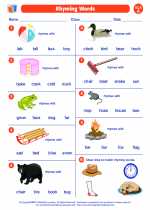Rhyming Words
Rhyming words are words that have the same ending sounds, especially when the sounds occur at the end of the words. Understanding rhyming words is an important skill for young learners as it helps develop phonemic awareness, which is the ability to hear, identify, and manipulate individual sounds in words.
To identify rhyming words, we need to listen to the ending sounds of the words. If the ending sounds are the same, the words rhyme. For example, "cat" and "hat" rhyme because they both end with the "-at" sound.
Examples of Rhyming Words
- bat, sat, mat
- dog, log, frog
- bell, shell, well
- moon, spoon, soon
Why Are Rhyming Words Important?
Understanding rhyming words helps children develop their phonological awareness, which is crucial for learning to read and spell. It also helps children recognize word patterns and improve their overall language skills.
Activities to Practice Rhyming Words
There are several fun activities that can help children practice identifying and generating rhyming words, such as:
- Rhyming Word Matching: Provide a set of picture cards with rhyming words and have the child match the words that rhyme.
- Rhyming Word Puzzles: Create puzzles with rhyming word pairs for the child to put together.
- Rhyming Word Bingo: Play a bingo game using rhyming words instead of numbers.
- Rhyming Word Memory Game: Create a memory game with pairs of rhyming words for the child to match.
Assessment
Assessing a child's ability to identify and produce rhyming words can be done through informal observations during activities and games, as well as through formal assessments such as asking the child to generate rhyming words for given word prompts.
Remember, practicing rhyming words should be enjoyable and engaging for young learners, so incorporating games and interactive activities is key to reinforcing this important skill.
[Rhyming Words] Related Worksheets and Study Guides:
.◂English Language Arts Worksheets and Study Guides First Grade. Rhyming Words
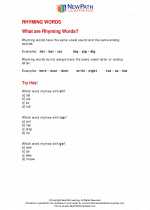
 Worksheet/Answer key
Worksheet/Answer key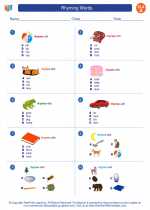
 Worksheet/Answer key
Worksheet/Answer key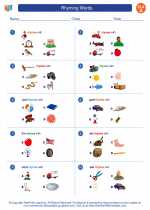
 Worksheet/Answer key
Worksheet/Answer key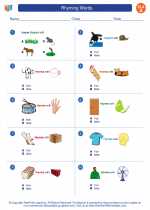
 Worksheet/Answer key
Worksheet/Answer key